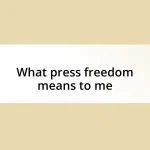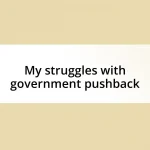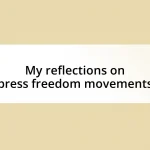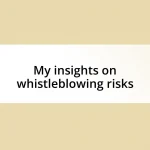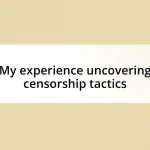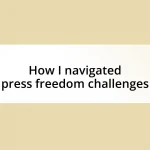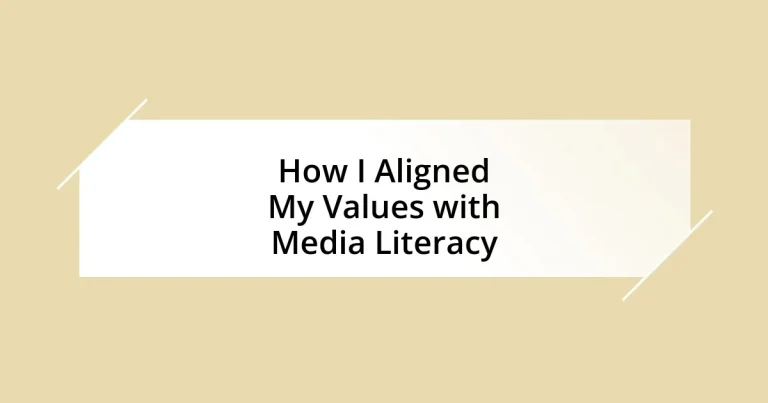Key takeaways:
- Media literacy involves critical engagement with content, questioning biases, and understanding underlying messages.
- Identifying personal values like integrity and empathy shapes how individuals approach and consume media, leading to more thoughtful interactions.
- Establishing a media literacy plan and practicing daily reflection helps ensure media consumption aligns with one’s values, enhancing overall understanding.
- Ongoing reflection on media consumption fosters personal growth and resilience, allowing for a dynamic alignment between values and the media one engages with.
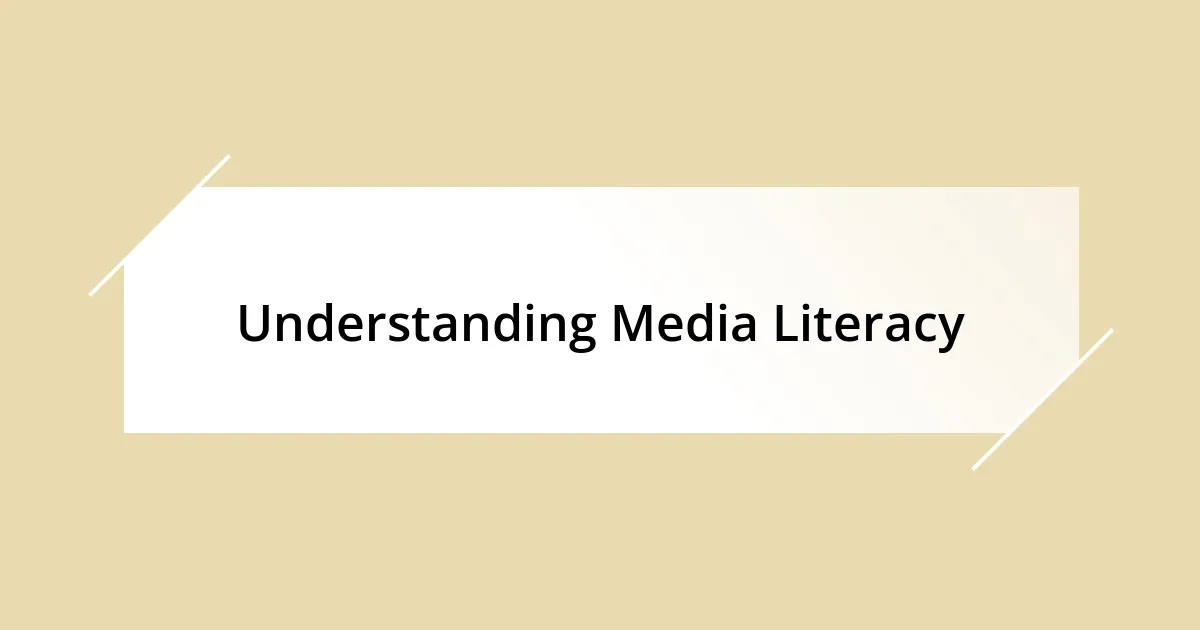
Understanding Media Literacy
Understanding media literacy is about more than just knowing how to consume content; it’s the ability to analyze, evaluate, and create media. I remember when I first discovered the importance of questioning what I see online. That moment felt like a light bulb going off—what if everything isn’t as it seems?
Media literacy empowers us to engage critically with the messages we encounter daily. I often find myself looking at news headlines and asking, “What’s really behind this story?” This inquiry has led me to uncover biases and motivations that influence reporting, which has transformed the way I perceive information.
Moreover, cultivating this skill is essential in our information-saturated age. I still get frustrated when friends share misleading articles without checking the facts. It’s a reminder of why I’m passionate about discussing media literacy—it’s not just an academic endeavor; it affects our daily lives and our understanding of the world around us.
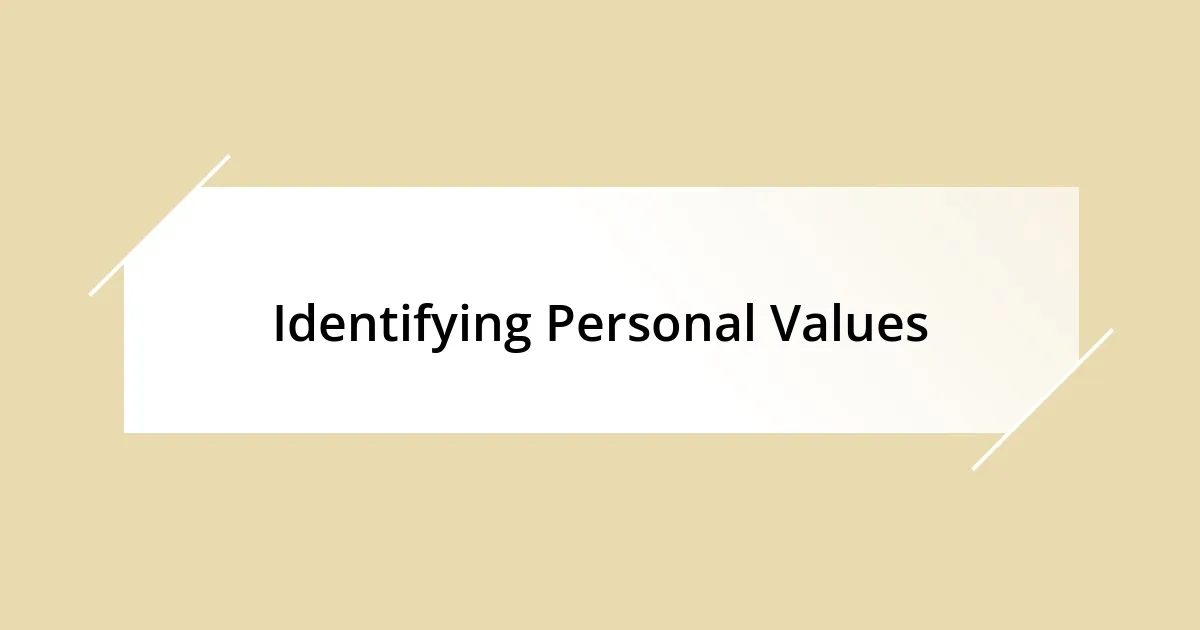
Identifying Personal Values
Identifying personal values is a journey that requires reflection and honesty. For me, it started with moments of self-discovery, especially during challenging times. I remember being overwhelmed by conflicting opinions in the media, which pushed me to ask myself what truly matters to me. Recognizing my core values—such as integrity and empathy—shaped my approach to information, guiding me to seek sources that align with those principles.
As I explored my values, I created a list that clarified what resonates with me on a deeper level. This exercise proved invaluable, particularly when encountering sensationalized content. When I see headlines that trigger strong emotions, I can now check in with my values. Do they align with indignation or compassion? Understanding this helps me process information more thoughtfully and respond in ways that reflect who I am.
I also started discussing values with friends, which led to surprisingly rich conversations. One memorable evening over coffee, we shared what integrity meant to each of us. This dialogue opened my eyes to different perspectives and reinforced how essential my values are in navigating media. I’ve found that when I align my media consumption with my personal values, I feel more grounded and confident in my understanding of the world.
| Personal Value | Media Consumption Insight |
|---|---|
| Integrity | Seek factual accuracy and reliability in sources. |
| Empathy | Engage with diverse perspectives and stories. |
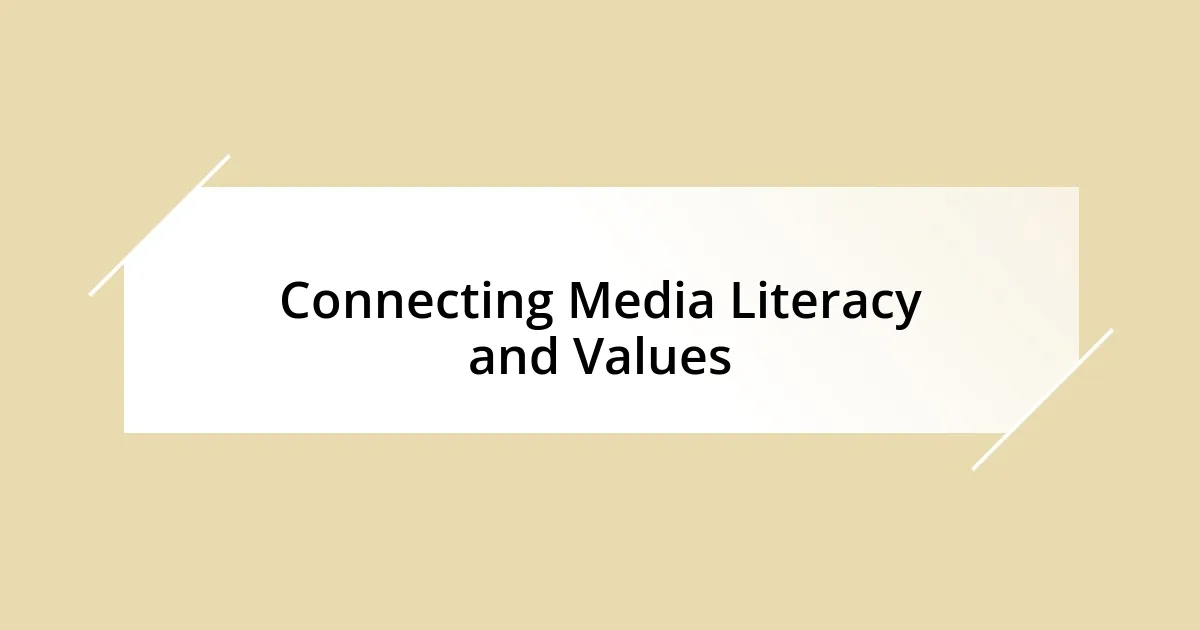
Connecting Media Literacy and Values
Connecting media literacy and values creates a powerful framework for understanding and interacting with the information around us. I vividly recall an instance when I encountered a viral post that sparked outrage. Instead of reacting immediately, I paused to reflect on my values. This moment of introspection led me to investigate the credibility of the claim. In doing so, I realized how quickly emotions can cloud our judgment, underscoring the need for a values-based approach in media literacy.
When I focus on aligning my media consumption with my core values, the difference becomes unmistakable. Here’s a breakdown of how my values shape my media interactions:
- Integrity: I prioritize sources that uphold ethical journalism, which has helped me cultivate trust in the news I consume.
- Empathy: This drives me to explore stories beyond my immediate experience, fostering a deeper understanding of diverse lives and perspectives.
- Curiosity: I approach information with an open mind, motivating me to ask questions and seek out various viewpoints before forming conclusions.
These connections reinforce my understanding and equip me to navigate the media landscape with confidence and clarity, making the entire process feel more enriching and aligned with who I am.
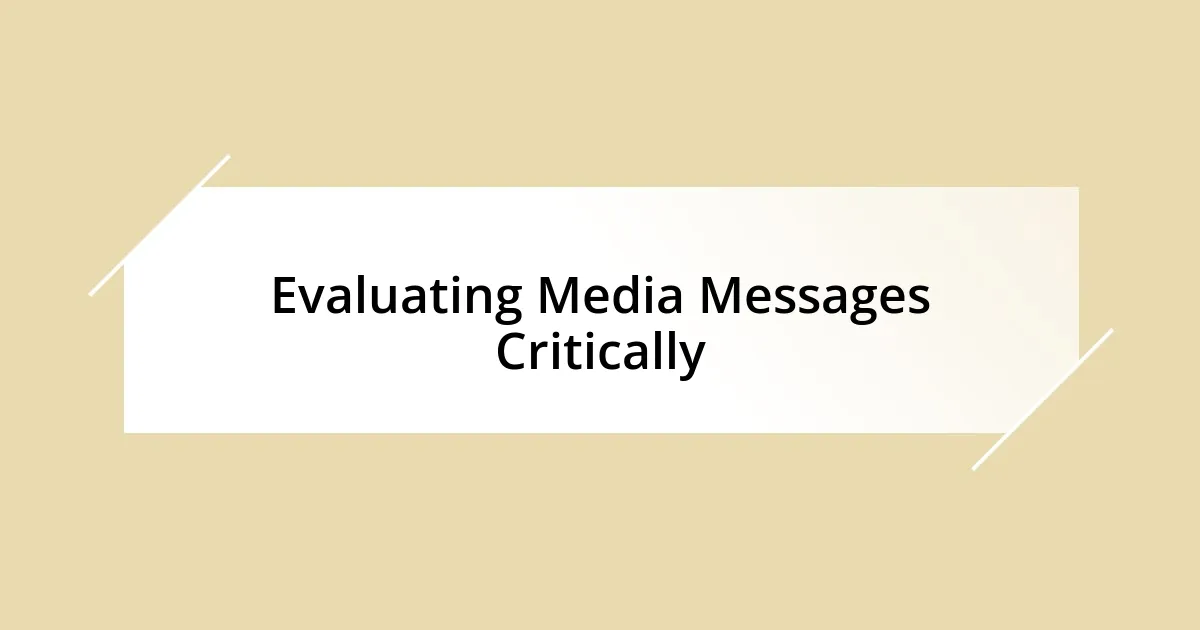
Evaluating Media Messages Critically
Evaluating media messages critically is essential in today’s fast-paced information age, where misinformation can easily take root. I often find myself asking, “What are the motivations behind this message?” When I come across an article, I look at who wrote it and what affiliations they might have. This question helps me uncover potential biases and think more deeply about the content presented.
One time, I stumbled upon a news segment that portrayed a community issue in a particular light. Instead of taking it at face value, I felt compelled to dig deeper. I reached out to local residents and gathered their insights. This experience drove home the realization that media can shape perceptions—even unintentionally. Engaging directly with individuals involved, rather than relying solely on the media narrative, enriched my understanding of the situation.
I also remind myself to consider whether the information aligns with my core values of integrity and empathy. Does the message encourage dialogue, or is it divisive? Events like recent protests illustrate the power of narratives; understanding the layers behind each media piece allows me to respond in ways that reflect empathy rather than jumping to conclusions. It’s fascinating to witness how a critical evaluation can transform my perception and deepen my connection with the world around me.
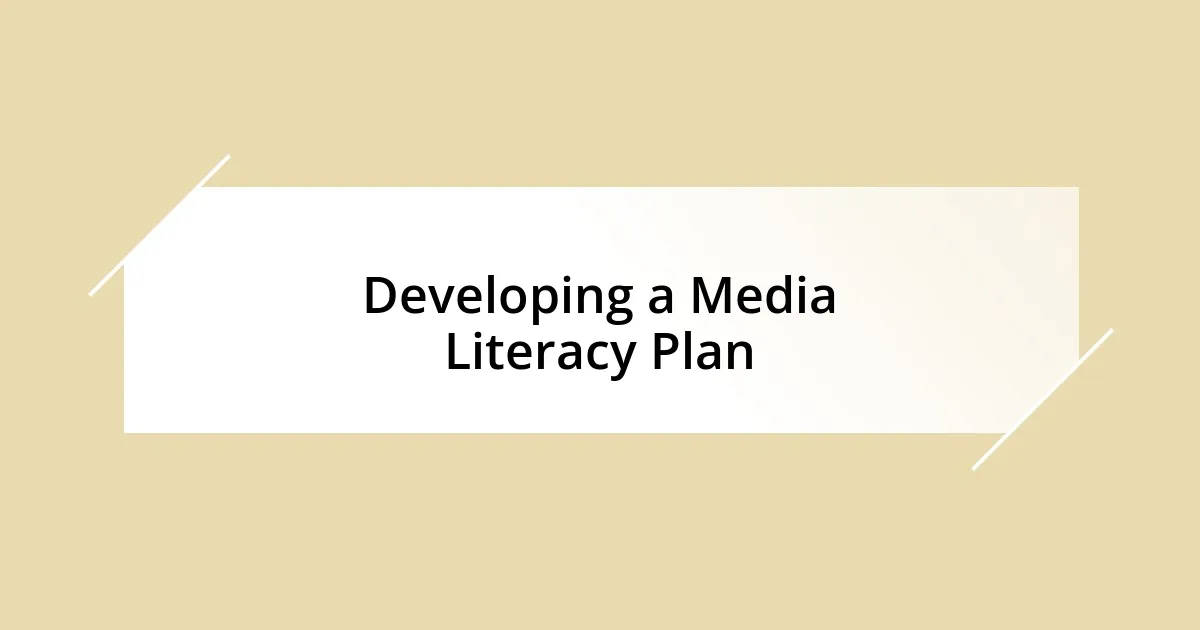
Developing a Media Literacy Plan
Developing a media literacy plan is all about establishing a structured approach to how I consume information. I started by identifying the values I want to prioritize—integrity, empathy, and curiosity. This step was crucial because it’s not just about understanding media, but about ensuring that the media I engage with resonates with who I am and what I believe in.
Next, I mapped out strategies that would help me stay on track. For instance, I set aside specific time each week to analyze articles and media sources through the lens of my values. One day, I decided to review my social media feeds, consciously filtering out platforms that didn’t align with my values. I began noticing the emotional toll of consuming sensationalized content; by simply shifting my focus, I felt lighter and more empowered.
Creating a media literacy plan isn’t just a checklist for me; it’s a living document. I continually assess its effectiveness by asking myself, “Am I still connecting with the media I consume?” This self-reflection leads to adjustments based on my evolving values and experiences. One memorable occasion was when I joined a community discussion about media responsibility. That conversation opened my eyes to the collective responsibility we all share in seeking accurate information, and it felt truly rewarding to be part of a community that values integrity in media.
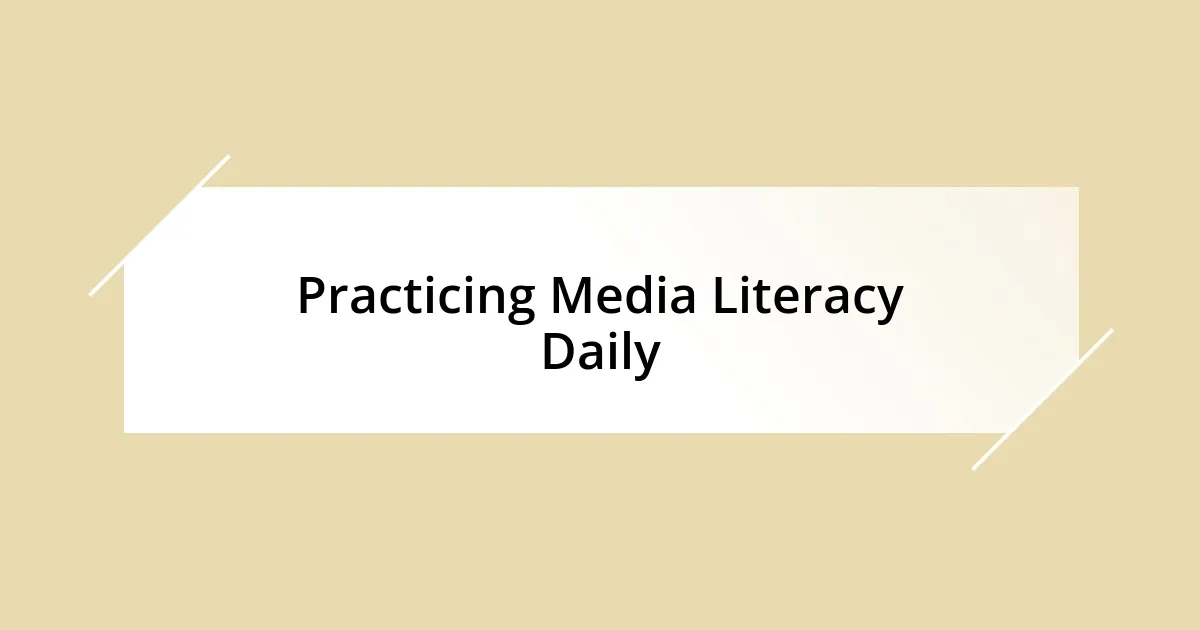
Practicing Media Literacy Daily
Practicing media literacy daily is about being intentional with every bit of information I consume. I make it a habit to pause and reflect whenever I encounter headlines that catch my eye. One morning, I scrolled through my news feed and saw an alarming title about a local event. Instead of jumping to conclusions, I asked myself, “What’s the full story here?” This pause gave me the clarity to investigate further, ensuring I had a well-rounded view before sharing it with friends.
I’ve found that discussions with family and friends also elevate my media literacy practice. Just the other night, we started talking about a viral video that stirred quite the debate online. As we unpacked it together, I realized how different interpretations can arise from the same content. That conversation illustrated the power of dialogue and how different perspectives can deepen my understanding of a media piece. Isn’t it interesting how we can grow collectively by sharing our thoughts?
Incorporating media literacy into my daily routine has become second nature. I now dedicate a few moments each day to explore not just what I’m reading but also how it makes me feel. Recently, I started journaling my reactions to certain articles. This exercise not only highlights my emotional responses but also reminds me to check my biases. How often do we reflect on what we consume? Taking this time helps me remain grounded in my values, ensuring that my media engagement is both thoughtful and meaningful.
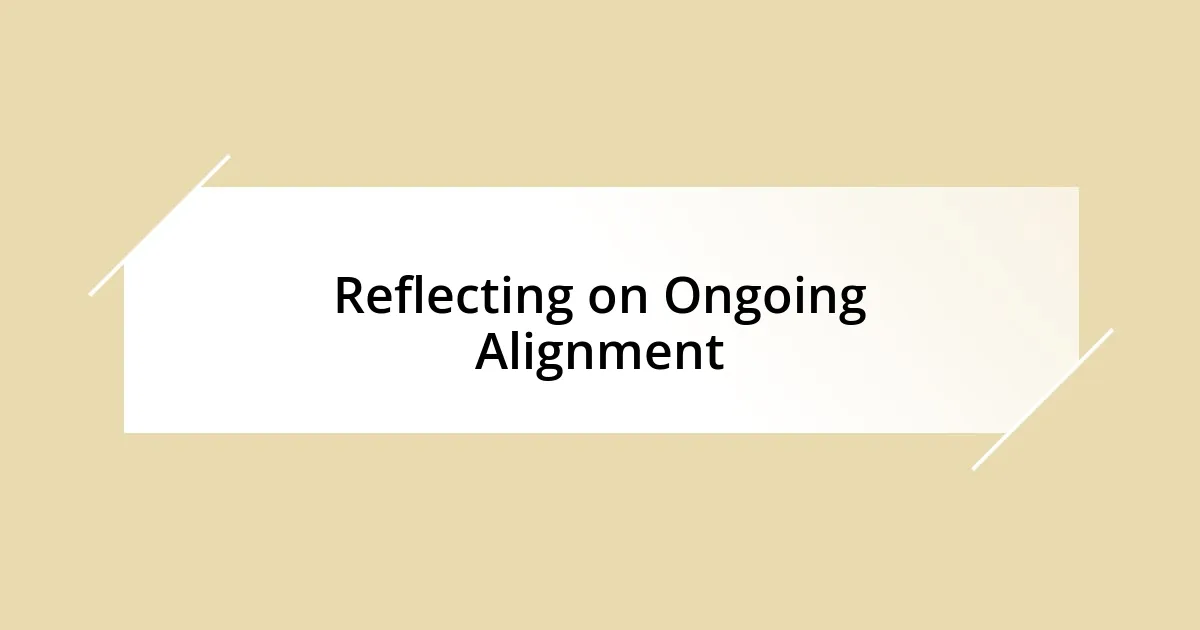
Reflecting on Ongoing Alignment
Reflecting on ongoing alignment with my values and media literacy feels like checking in with an old friend. I recently stumbled upon a powerful article that critiques misinformation in the media. As I read, I couldn’t help but think about how much my views have evolved; content that once sparked my interest now feels misaligned with the integrity I strive for. Have you ever felt that shift when revisiting something you once loved?
Not long ago, I found myself in a deep conversation with a close friend about how social media shapes our perceptions. We both realized that our experiences had shifted, and now, connecting our values to what we read has become essential. It’s almost liberating to express how certain platforms drain us rather than enlighten us, isn’t it? I often ask myself, “Is this media source still a reliable reflection of my aspirations?”
Through this ongoing reflection, I’ve started to embrace the idea that aligning my media consumption with my values isn’t just a static process—it’s dynamic and ever-evolving. I remember a time when I indulged in sensational news, often feeling anxious afterward. Now, I curate my feed with intention, seeking out voices that inspire empathy and foster understanding. This choice not only enriches my media experience but also reinforces my commitment to personal growth and resilience. How powerful is it to choose content that uplifts rather than weighs us down?
